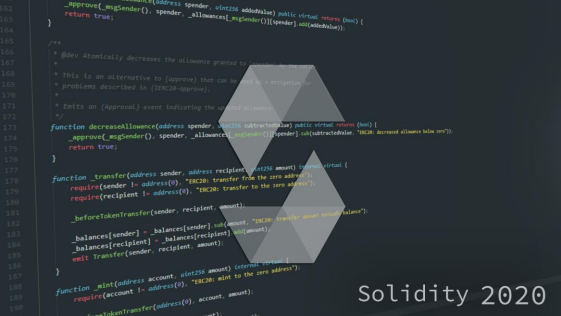
Solidity Programming Language: An In-Depth Look at Solidity, the Programming Language Used for Writing Smart Contracts on Ethereum
Introduction:
In the world of blockchain and decentralized applications, Solidity has emerged as a powerful programming language for writing smart contracts on the Ethereum platform. As Nigeria embraces the potential of blockchain technology, it is crucial for developers and aspiring blockchain enthusiasts to understand the fundamentals of Solidity. In this article, we will take an in-depth look at Solidity, its features, and its significance in the Nigerian blockchain ecosystem.
1. Understanding Solidity and Smart Contracts:
Solidity is a statically typed, contract-oriented programming language designed specifically for Ethereum. It allows developers to write smart contracts that execute autonomously on the Ethereum Virtual Machine (EVM), enabling trustless transactions and decentralized applications (dApps). Smart contracts act as selfexecuting agreements with the terms of the agreement directly written into code.
2. FEATURES OF SOLIDITY:
2.1. Syntax and Structure:
Solidity is a statically typed, contract-oriented programming language designed specifically for Ethereum. It allows developers to write smart contracts that execute autonomously on the Ethereum Virtual Machine (EVM), enabling trustless transactions and decentralized applications (dApps). Smart contracts act as self executing agreements with the terms of the agreement directly written into code.
2.2. Modifiers and Access Control:
Solidity provides modifiers to modify the behavior of functions in smart contracts. Modifiers allow developers to add additional conditions or actions to functions, enhancing security and efficiency. Access control mechanisms, such as the "public," "private," and "internal" keywords, ensure that only authorized parties can interact with specific contract functions.
2.3. Event Logging and Exception Handling:
Solidity supports event logging, enabling contracts to emit events that can be captured by dApps or external systems. This feature facilitates real-time notifications and efficient data synchronization. Additionally, Solidity provides exception handling through the "try-catch" mechanism, allowing contracts to handle and recover from exceptional situations gracefully.
3. IMPORTANCE OF SOLIDITY IN THE NIGERIAN BLOCKCHAIN ECOSYSTEM:
3.1. Empowering Financial Inclusion:
Nigeria, with its large unbanked population, can benefit greatly from blockchain technology. Solidity enables the creation of decentralized financial applications, offering innovative solutions for banking, remittances, and access to financial services. By leveraging Solidity, Nigerian developers can contribute to bridging the financial inclusion gap in the country.
3.2. Smart Contract Auditing and Security:
Solidity's static typing, strong typing, and extensive testing frameworks make it suitable for auditing smart contracts. With the rise in blockchain-based scams and security vulnerabilities, Nigerian developers equipped with Solidity expertise can play a crucial role in ensuring the security and integrity of smart contracts, bolstering investor confidence.
3.3. Job Opportunities and Entrepreneurship:
As blockchain adoption grows in Nigeria, there is an increasing demand for skilled Solidity developers. By learning Solidity, aspiring developers can unlock job opportunities in both local and global blockchain projects. Moreover, Solidity proficiency can empower Nigerian entrepreneurs to build and launch their blockchain-based startups, contributing to economic growth and innovation.
4. SOLIDITY DEVELOPMENT TOOLS AND RESOURCES:
4.1. Integrated Development Environments (IDEs):
Various IDEs, such as Remix, Truffle, and Visual Studio Code, provide Solidity developers with essential features like syntax highlighting, debugging, and deployment tools. These IDEs streamline the development process, making it easier for Nigerian developers to create and test smart contracts.
4.2. Online Communities and Forums:
Nigerian developers can leverage online communities and forums, such as the Ethereum Stack Exchange, Reddit's r/ethereum, and Discord channels, to connect with experienced Solidity developers and seek guidance. These platforms offer a wealth of knowledge, code snippets, and troubleshooting tips.
4.3. Solidity Documentation and Tutorials:
The official Solidity documentation, along with numerous online tutorials and video courses, serve as invaluable resources for learning Solidity. Nigerian developers can leverage these materials to grasp Solidity's concepts, syntax, and best practices.
CONCLUSION:
Solidity plays a vital role in the Nigerian blockchain ecosystem, enabling the development of decentralized applications and secure smart contracts on the Ethereum platform. By understanding Solidity's features and embracing its potential, Nigerian developers can actively contribute to the growth of blockchain technology in the country. As blockchain adoption continues to rise, acquiring Solidity skills opens up exciting opportunities for entrepreneurship, job creation, and financial inclusion in Nigeria's dynamic blockchain landscape.


2 Comments
"
ghfukyfuk
August 14, 2023 at 07:06 pmadmin
"" gdsg?>
August 14, 2023 at 07:05 pm1 of 1